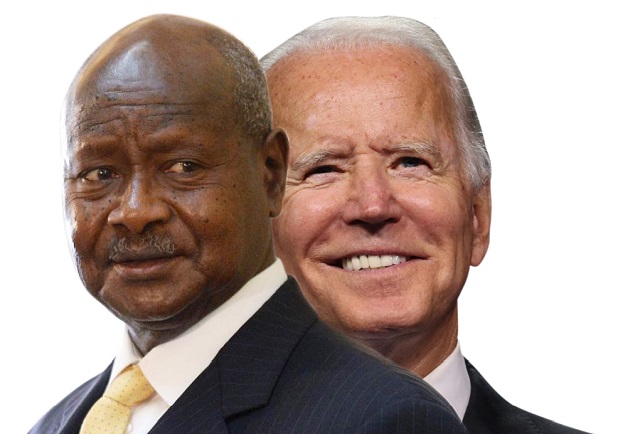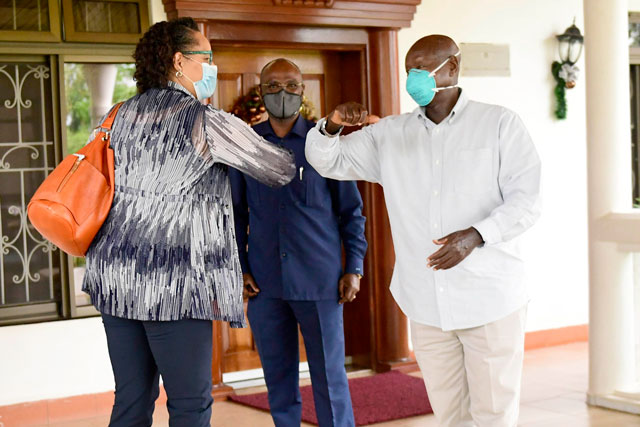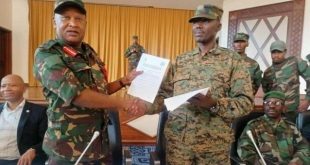
Eyes on new U.S. President Biden for review of Uganda relations amid human rights violations
Kampala, Uganda | IAN KATUSIIME | Ned Price, the U.S State Department spokesperson, during a press briefing on Feb. 23 said new U.S. President Joe Biden’s government would consider a range of options for those who may have perpetrated abuse during the Jan. 14 presidential elections in Uganda.
“Uganda’s January 14 elections were marred by elections irregularities and abuses by the government’s security services against opposition candidates and members of the civil society. We will consider a range of targeted options to hold accountable for what we saw in relation to Uganda elections,” he said.
Price acknowledged the role Uganda and Museveni play in regional stability, especially with AMISOM in Somalia, and added: “We can pursue our interests and values at the same time.”
Biden has clocked a month in office, is in review mode, and his foreign policy agenda is shaping out. Ned Price’s comments possibly signaled the first indication of the Biden administration’s attitude towards President Yoweri Museveni who secured a sixth term in the January polls that were allegedly tainted.
The U.S. State Department, especially the office of Assistant Secretary of State for African Affairs, is the go-to position for the US Administration on running US foreign policy with African nations.
The diplomats in this department can have major impact on US relations with countries on the continent depending on their personality and maneuvers.
The statement by the U.S. State Department spokesperson was the latest in a long running dynamic between the two countries.
Strong exchanges
There were a series of exchanges between the government of Uganda and U.S. State department officials in the last weeks of former President Donald Trump’s administration.
Tibor Nagy, the Assistant Secretary of State for African Affairs under the Trump administration, issued a fusillade of tweets critical of the Ugandan government in days leading up to and after the Jan. 14 election.
Nagy also called for the release of Nicholas Opiyo, a Ugandan human rights activist, on Christmas Day last year after Opiyo was abducted commando style by security operatives while at a restaurant in Kampala.
Nagy is believed to be the mastermind behind the US sanctioning of former Inspector General of Police Gen. Kale Kayihura in September 2019 on accounts of torture of Ugandans, corruption and other human rights violations Kayihura allegedly committed.
According to some reports, Kayihura appealed to Nicholas Opiyo, who he believed to be networked internationally, to have the U.S. sanctions on him lifted. Sources however say lifting of sanctions on individuals, never mind nations is a complex process that takes years of negotiations and back channeling.
As Nagy was clearing out his office in January, there were looming sanctions on a number of Ugandan security commanders due to the security crackdown on opposition politicians and their supporters in the lead up to the 2021 election.
The sanctions were recommended by American congressman Eliot Engel who chairs the U.S. House Committee on Foreign Affairs. Engel cited the Ugandan commanders’ alleged involvement in human rights abuses past and present.
Those targeted included Lt. Gen. Peter Elwelu, the Commander of Land Forces, Maj. Gen. James Birungi, the Commander of the Special Forces Command, Maj. Gen. Don William Nabasa, the former Commander of the Special Forces Command, Maj. Gen. Abel Kandiho, the Chief of Military Intelligence, (CMI) Maj. Gen. Steven Sabiiti Muzeyi, the Deputy Inspector of General of Police, Frank Mwesigwa, a Commissioner of Police, and Col. Chris Serunjogi Ddamulira, the Director of Crime Intelligence.
Some of the figures mentioned are notable because President Museveni said CMI was behind some of the “disappearances” of Ugandans whom the state suspected of a number of crimes.

Nagy was replaced by Robert Godec, who is a former U.S. Ambassador to Kenya. Godec is still in acting capacity and may be wary of making any combative statements. But analysts will be observing his future public statements when he is confirmed. His boss, the US Secretary of State, Anthony Blinken, has also kept a relatively low profile for America’s top diplomat. With a new administration, it awaits to be seen what the engagement will entail.
More continuity
Critics of Museveni and the opposition always find themselves in a bind because whereas American diplomats put out eloquent statements denouncing Museveni, the same government extends military aid to the longtime leader and quietly refer to him as a strong ally on counterterrorism and security.
As Biden considers the ever thorny issue of U.S. military engagement in Africa, he might have to decide on the future of a lofty annual military aid package to Uganda under Museveni who has been in power for 35 years.
Biden was in the room as vice president when the government of Barack Obama agreed America’s military package for Museveni in 2014.
At the time, an official letter from the U.S. Department of Defence to a U.S. Congressional committee on foreign affairs indicated that Uganda was eligible to receive military assistance worth U$12.6m for counterterrorism programs.
This money was directed to the Special Forces Command (SFC), a semi-independent unit of the Uganda Peoples Defence Forces (UPDF). The letter from the department of defence indicated that the SFC would undergo human rights “vetting” before such assistance is provided. It is not clear what entailed the vetting process and the assistance to the SFC went ahead.
Today, the SFC is tasked with protecting President Museveni, his family and other critical national security assignments in Uganda. The unit is now under the command of Museveni’s son Lt. Gen. Muhoozi Kainerugaba.
The package was a tip of the kind of military aid Uganda has continually received from U.S. and it has gone on for years.
Moses Khisa, an assistant professor of political science at North Carolina State University, U.S., says there is likely to be more continuity than change in American foreign policy towards Uganda under the new Biden administration.
“A few things may change here and there, and the rhetoric will certainly be louder and more pronounced than under Trump, but in substance I highly doubt there will be much change.”
Khisa adds “Remember foreign policies are crafted and implemented by career foreign service officials who remain in office even when there is change at the top.”
He agrees that there is a lot of speculation towards Biden’s overtures towards Uganda but remains unconvinced by what’s doing the rounds.
“I believe that the US is generally keen on seeing a smooth succession in Uganda but its role depends on the balance of forces inside Museveni’s ruling core and the Uganda society.”
Khisa says Museveni will as he is wont to, have a fallback position in case anything goes awry. “If history tells us something on this issue, it is that rulers like Museveni get more emboldened and whip up nationalist sentiments when foreign powers try to pressure them.”
 The Independent Uganda: You get the Truth we Pay the Price
The Independent Uganda: You get the Truth we Pay the Price




For latest African political news: https://www.africanpolicy.com
The US relationship with Saudi Arabia and Israel is one that typically defines US foreign policy. Saudi Arabia consistently ranks lowest in human rights (executions, ill treatment of women, no free press whatsoever, religious intolerance, disappearances and murders of critics – like Khassoghi, etc.). It also scores poorly on democratic governance (if that means elections and changing leaders every 5 years). Israel on the other hand continually commits crimes against the Palestinians reminiscent of South Africa’s apartheid regimes including land grabbing and constructing illegal settlements against international law, assassinations of “freedom fighters” using American weapons as well as air, land and sea blockages in the name of “Israel defending itself” against “terrorists”, etc. So it would be full hardy of any sane Ugandan to think this will change between Biden and M7. More financial and military assistance will flow in despite Kyagulanyi being tear gassed by substances procured from the UK, despite the over 50 protestors killed by US fire arms, etc. Basically, for as long as Al-Shabab exists and South Sudan is still a mess, M7 and the US will be feeding from the same breast!!!!